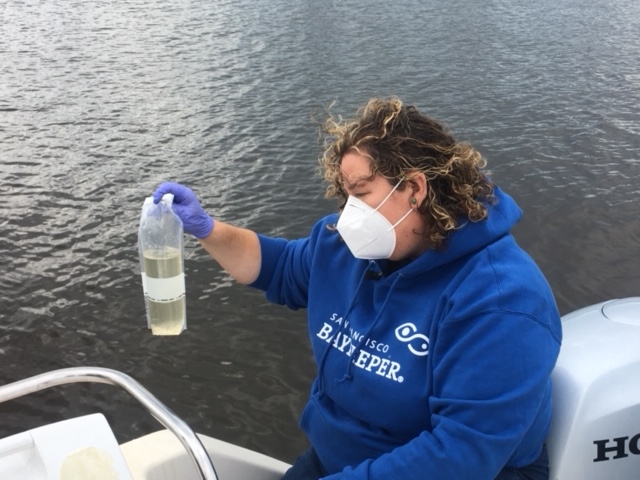Field investigation: Holding polluters accountable with MNR graduate Aundi Mevoli
November 15, 2022

By Lindsay Kuczera
Most days, you’ll find Aundi Mevoli patrolling San Francisco Bay in a boat, taking water samples to identify sources of pollution. As the San Francisco Baykeeper's field investigator and policy advocate, Aundi helps the nonprofit watchdog defend the Bay from its biggest polluters and hold government agencies accountable.
Threats to the Bay
San Francisco Bay faces many man-made threats. Industrial pollution, runoff, raw sewage spills, oil tankers, and hazardous chemicals pose a risk to the Bay and its watershed, while ongoing mining, dredging, and habitat destruction also threaten its communities and wildlife. Just recently, chronic excessive wastewater treatment discharge into the Bay led to an algae breakout, turning the water brown and threatening wildlife. Aundi focuses much of her time on sea level rise and groundwater pollution from toxic sites. When she finds issues that need attention, she often engages city officials to make sure that their strategic plans include resilience measures that address sea level rise and site cleanup.

Another aspect of Aundi’s work is in strengthening state and local laws through litigation or legislation. A disproportionate amount of pollution unjustly affects communities of color and low-income communities. By working directly with community partners to hear what concerns they have and inform them of what’s been found through field investigation, Baykeeper, partner organizations, and the community can collaboratively create a solution to address the area’s most burdensome issues.
Finding your path
With a background in healthcare, Aundi knew the transition to the environmental space might be a difficult one. She enrolled in Virginia Tech’s Master of Natural Resources (Online) program, which gave her the flexibility to discover what aspect of sustainability she was most interested in and tailor her studies around it.
The first class she took was Sustainability Systems, a required core class in the program. Aundi felt that this class helped her understand how to approach sustainability problems and how to best evaluate and offer solutions. Aundi then took elective classes that taught her about climate policy, coastal systems, watersheds, and urban planning. She realized her passion for addressing water issues and policy, and focused on those courses that would set her up to enter the field.
Learning about stormwater systems was helpful in her daily work with Baykeeper. Aundi applies her new knowledge to policy compliance, advocacy, and proper management of the region’s stormwater systems. In addition, the skills Aundi learned in the MNR communications course continue to help her craft Baykeeper’s messaging, especially when engaging the public. “It’s more than just education or rhetoric, it’s about building meaningful trust with communities,” Aundi added.
Shifting the narrative on health
Healthcare to environmental sustainability may seem like a big leap, but Aundi was able to make the connection by working with CLiGS career counseling services. “They helped me craft cover letters that would highlight how my experience as a healthcare provider, as a professional, and as a business owner were relatable to the environmental field,” said Aundi. Being able to get the help she needed to frame her healthcare experience into public and environmental health experience was vital in getting job interview callbacks and ultimately securing a position with Baykeeper.


